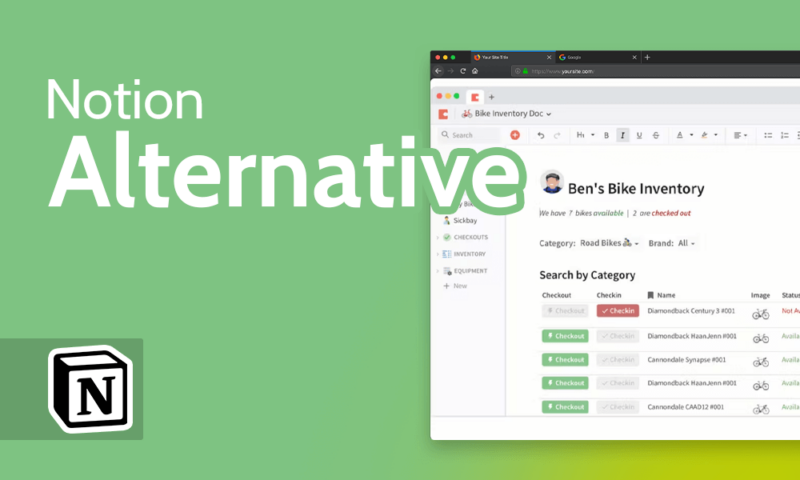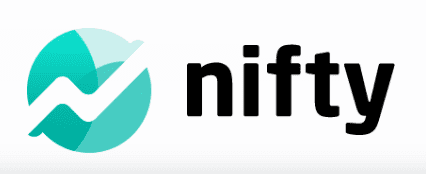13 Best Notion Alternatives in 2024: Free & Paid Competitors for Project Management & Note-Taking
Notion is a popular tool for good reason. It appeals to users looking for basic task management software and attracts those needing a more expansive project management tool. However, it has its flaws, and there are several reasons it may not be what you want. To ensure you’re not left empty handed, we have 13 Notion alternatives for you to consider.
Key Takeaways: 13 Best Notion Alternatives
- monday.com — The best project management software, bar none.
- ClickUp — It has an equally good document creator and excellent task management tools.
- nTask — It’s insanely cheap while having premium features.
- Zoho Projects — A great option if you’re already in the Zoho ecosystem.
- Asana — The app has a great design, plenty of features and is useful for team collaboration.
- TeamGantt — It’s the master of Gantt charts and has many other quality features.
- Hive — We like its contemporary design and video-calling capabilities.
- Basecamp — It’s light on features, but everything it offers is high quality.
- Nifty — A great tool for basic task management and for managing complex projects.
- Trello — The Kanban king; nothing more and nothing less.
- Evernote — The best note-taking alternative to Notion.
- Simplenote — A basic note-taking app for those requiring a decent free option.
- Zoho Notebook — An affordable note-taking app with premium features.
Notion is an all in one project management platform that allows you to implement successful project management and be productive along the way. It’s also a decent note-taking app and a space for Wikis — there’s little you can’t do on the platform. However, it’s not for everyone and there are other options available. Let’s take a look at the best Notion alternatives.
Our Notion review highlights all its pros and cons. When using the software, we particularly enjoyed its in-house document creator and its features that allow you to create Wikis. The task management tools were also easy to use, and there are plenty of project management views — all this makes it one of the best project management software.
We couldn’t ignore Notion’s tricky platform navigation, though, and its design is sure to be polarizing. It also lacks some advanced tools for team communication. With that, we have curated a selection of software that has all the best project management tools and that overcome Notion’s shortcomings.
What Makes the Best Notion Alternatives?
We have reviewed every Notion alternative you’ll find below. All of them are arguably stronger all round compared to Notion. Here are the top alternative considerations should provide:
- Affordable cost, ensuring you won’t need to break the bank when choosing your Notion alternative.
- User-friendly software, offering excellent user interface designs and smooth navigation.
- Different project views, including Kanban boards and Gantt charts, which are more refined and intuitive than those on Notion.
Because Notion is a jack of all trades, it doesn’t excel in all its areas. That’s why we included three dedicated note-taking apps in addition to 10 project management tools, so you can access features such as advanced search functionality and a range of note-taking tools and capabilities.
The 10 Best Notion Alternatives for Project Management
For these Notion alternatives, we will explain each platform’s core features, cost, and strengths and weaknesses. For an even better understanding, we recommend checking out each tool’s review, which we will share with you below.
1. monday.com
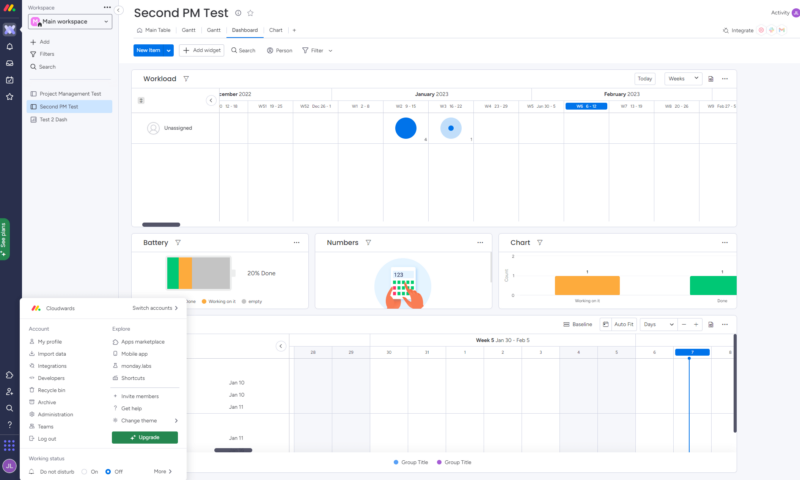
More details about monday.com:
- Pricing: $12
- Free plan: Yes, limited to two users per account
- Provider website: monday.com
Pros:
- Great management tools
- Nice design interface
- Good-value advanced plans
Cons:
- Weak free & Basic plans
monday.com has all the tools you need for effective project and task management, and it’s incredibly simple to use. With bright, bold colors and fonts that are easy to digest, monday.com is up there with the best user interface designs of the project management space.
Don’t think it’s just a pretty face. In fact, with its superb Gantt chart, smooth-running Kanban board and straightforward software navigation, monday.com makes managing projects feel effortless. A stand-out feature is the dashboard. Here you can open multiple views simultaneously to get a diverse perspective of your project, which is especially helpful for complex projects.
Additionally, monday.com is also packed with over 200 project templates, so no matter what you’re working on, you can get up and running quickly. To keep your workflow fast, you can program a ton of automations; for example, automatically sending notifications when a task is complete.
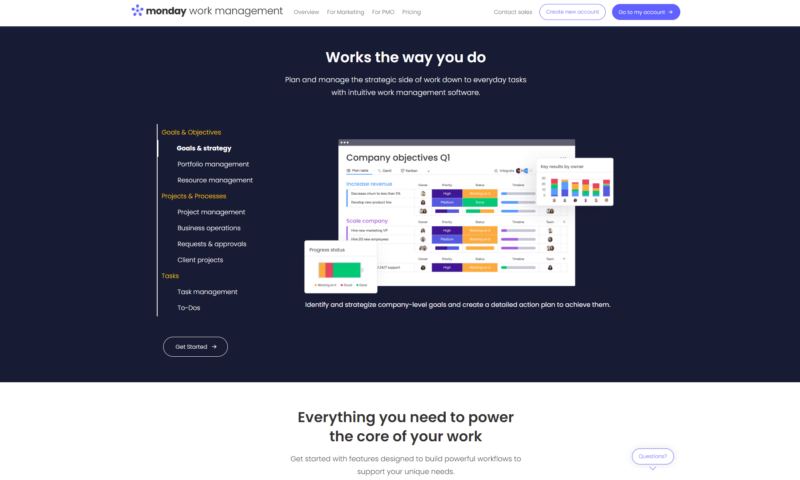
We’re not fans of monday.com’s free and Basic plans because they’re too limited. However, the Standard plan has plenty of features and it offers excellent value at $9 per user per month on annual billing. You can learn more about the service via our monday.com review.
- Maximum users: 2
- Minimum users: 3
- Minimum users: 3
- Minimum users: 3
2. ClickUp
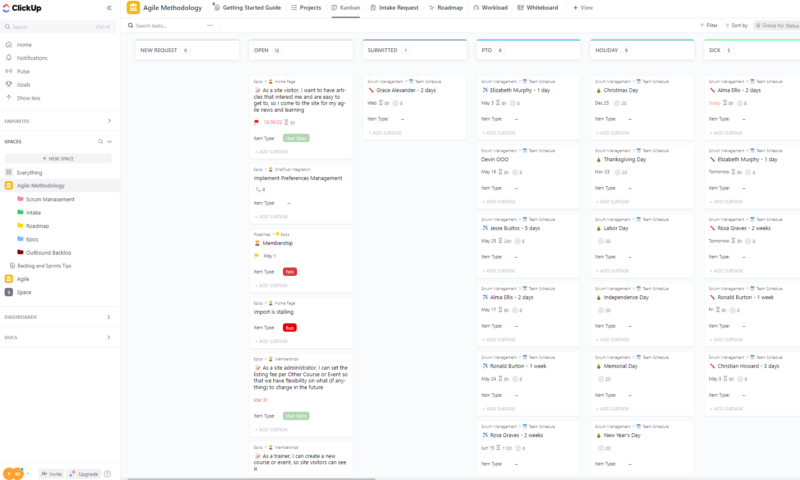
More details about ClickUp:
- Pricing: $10
- Free plan: Yes, limited to five workspaces
- Provider website: clickup.com
Pros:
- Very generous free plan
- Affordable paid plans
- Strong team collaboration
Cons:
- Could improve mobile apps
Much like Notion, ClickUp is an excellent team collaboration tool. Unlike Notion, ClickUp provides users with a dedicated chat tool. Within the tool you can send standard messages, voice notes, GIFs and emojis. It’s a fun but also very useful way of interacting with other users about tasks, your project or anything you fancy.
ClickUp also has mind maps and a white board, making it a more advanced team collaboration software. With mind maps, you can curate a long-term plan for your project and visualize it all on one page. The white board is best used as a space log to share ideas and interact with other team members.
On a project management front, all the usual suspects are available: a Gantt chart, to-do lists, a calendar and more. You also have up to 50 native app integrations so you can diversify your workflow in a way that suits you and your team. Integrations include Zapier, Google Drive and Toggl Track, to name a few.
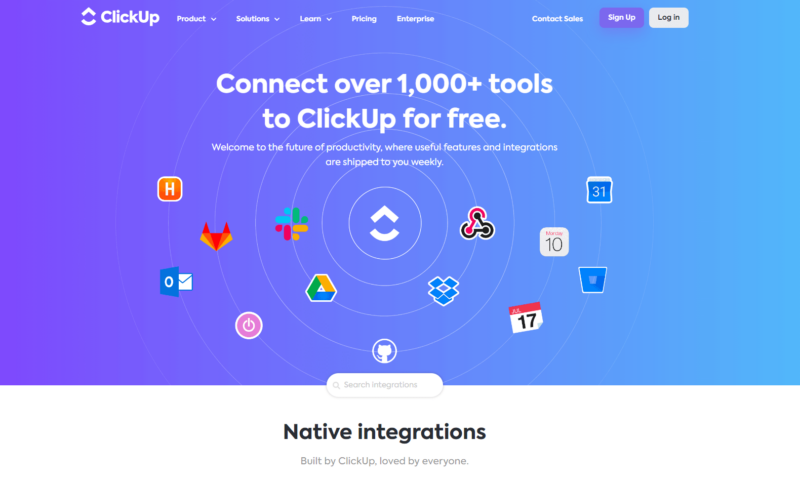
ClickUp has all the features you would want on its free plan, however there are some usage limitations. The best value is on the Unlimited plan, which only costs $7 per user per month on annual billing. Learn more about the software in ClickUp review.
- Basic functionality with some limitations
- All prices per user
- All prices per user
3. nTask
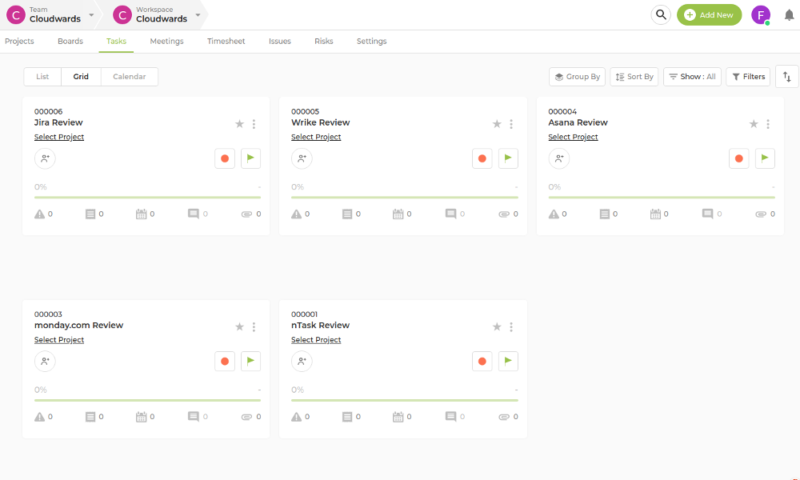
More details about nTask:
- Pricing: $4
- Free plan: Yes, limited to five users
- Provider website: ntaskmanager.com
Pros:
- Very cheap plans
- Plenty of key features
- Multiple viewing options
Cons:
- Rather bland design
Because of its diverse features and incredible value, it’s almost impossible to leave nTask out of any of our round ups. Some key features include (but aren’t limited to) a grid view and Gantt chart for standard project management. There’s also an issue tracker for a more Agile project management approach.
You can create notes and log any relevant details pertaining to a project. It’s not the best Notion alternative for note-taking, but it does the job. There are also built-in time-tracking tools so you can accurately log how long you spend working on individual tasks.
For us, nTask has a very user friendly interface. This is mainly down to how well-organized each feature and view is, and how easy it is to find what you need. It takes no time to change views, and we like the look and feel of the full project overview in the dashboard. nTask can be a bit of a clickfest sometimes, though, and that’s certainly an area for improvement.
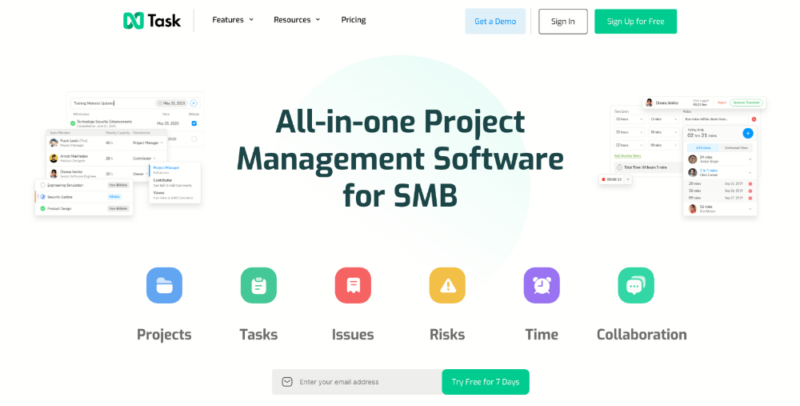
nTask’s free plan is very good and suitable for small teams. Not all the features are available, however, but thankfully the paid plans are extremely affordable. You can get nTask for as little as $3 per month (one-year plan) per user per month, making it one of the best cheap project management software. See more on pricing and features in our nTask review.
- Maximum 5 team members.
- No minimum or maximum team members.
- No minimum or maximum team members.
4. Zoho Projects
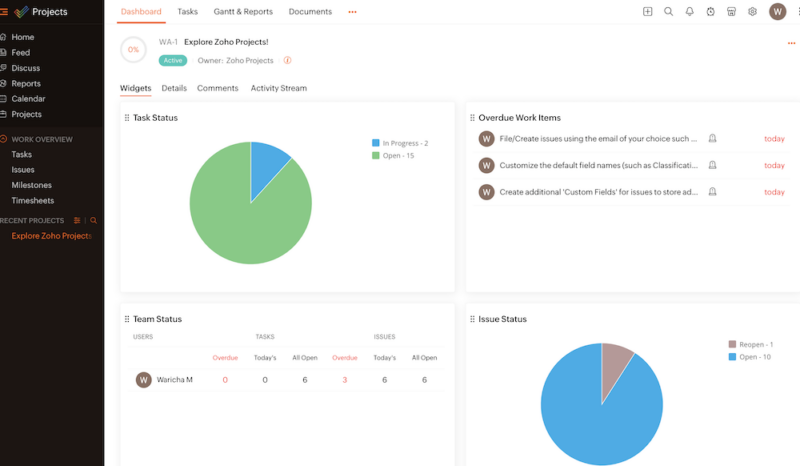
More details about Zoho Projects:
- Pricing: $4
- Free plan: Yes, limited to two projects per account
- Provider website: zoho.com
Pros:
- Superb priced plans
- Native document creator
- Customizable UI
Cons:
- Lacks integrations
Zoho Projects is a fantastic option for those looking for a cheap Notion alternative. It’s not strictly a note-taking app (nor is Notion), however it does have a native document creator. Here you can do some note-taking or draft long-form articles that relate to your work. It doesn’t have built-in AI, though, so you’ll need a human to do all the writing.
Customizable templates cater to a range of industries and project types. They’re available only on the Premium plan and above, but they’re affordable. Sticking with customization, you can also create a user interface that suits your needs. You have control over colors and fonts, and you have 24 different themes to choose from, as well.
Zoho Projects has a dedicated chat tool to improve team collaboration. All your messages are encrypted to prevent third-party access. There’s no end-to-end encryption, though, meaning Zoho has full control over the encryption keys. We’re not aware of any breaches in security so you can send messages to other users with full confidence.
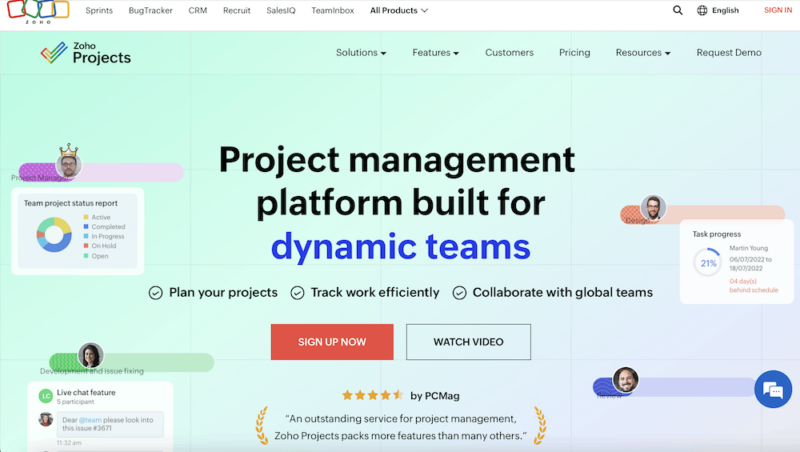
The free plan limits you to two projects per account, so it’s ideal only for individual use. The Premium plan costs only $4 per user per month, making it a great project management software for those on a light budget. Learn more through our Zoho Projects review.
5. Asana
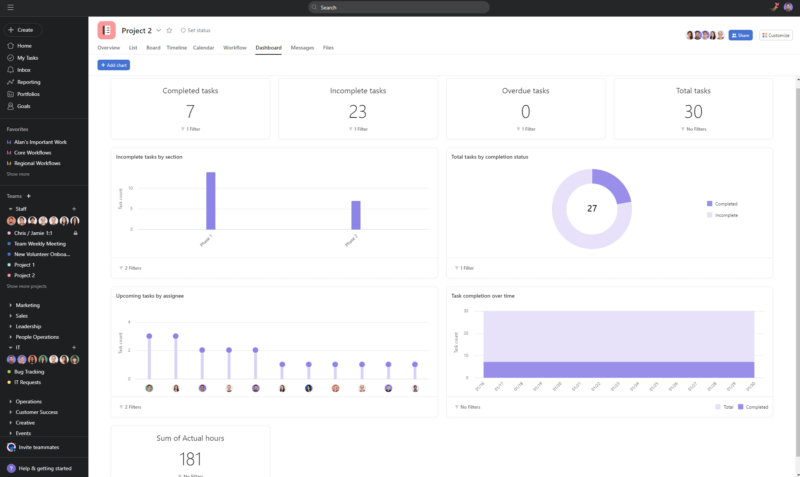
More details about Asana:
- Pricing: $13.49
- Free plan: Yes, limited project views.
- Provider website: asana.com
Pros:
- Robust free plan
- Modern design
- Lots of functionality
Cons:
- Not the cheapest
Asana can help you create to-do lists and implement more advanced project management processes. Its intuitive interface helps you get your tasks in order and your project layout easily defined. We love all the project views and especially like the ultra-smooth drag-and-drop functionality used for moving task cards.
With over 100 third-party apps, you can likely connect Asana with your favorite software. The type of integrations available depend on the plan you’re on, with Asana making more features available on higher-paid subscriptions. Simple integrations — with the likes of Slack and Zoom — are available, as are more advanced apps such as Adobe Creative Cloud and Tableau.
Asana may not be as good of a productivity tool as Notion, but it does have a dedicated inbox, making it one of the better collaboration tools on the market. You can link conversations to specific tasks and assign tasks during your conversations. Users have the option of sending direct messages or creating group conversations. It’s also a solid Slack alternative for project management.
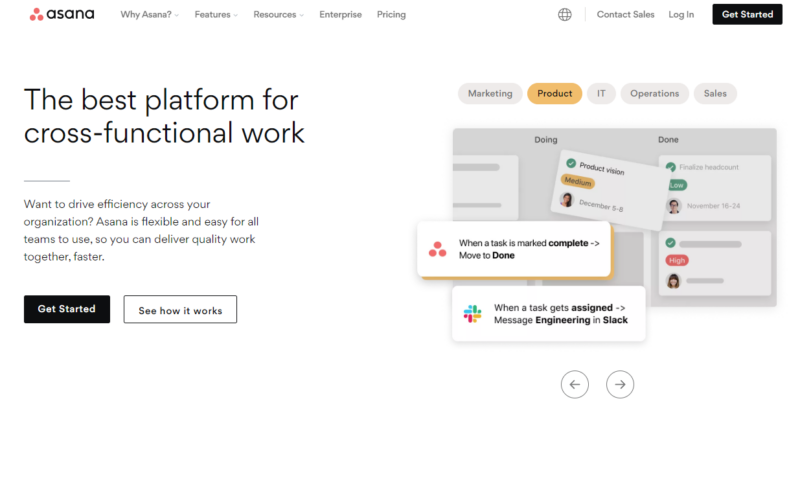
Asana is one of the best free project management software. On the Asana free plan, you can create unlimited projects and tasks, plus send unlimited messages. Advanced task management functionalities — like setting dependencies and milestones — are not available, though. Paid plans start at $10.99 per user per month on annual billings. It’s not cheap but it’s worth it. See more in our Asana review.
- Up to 10 users
- Price is per user. unlimited users, even more features
- Price is per user. unlimited users, expanded features
6. TeamGantt
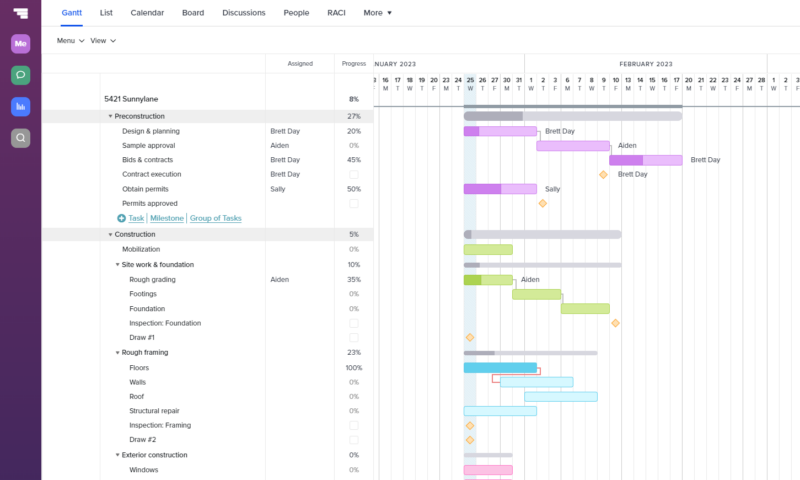
More details about TeamGantt:
- Pricing:
- Free plan: Yes, limited to one project and 60 tasks.
- Provider website: teamgantt.com
Pros:
- Best Gantt chart tool
- Very easy to use
Cons:
- Limited free version
TeamGantt is hands down the best Gantt chart software available. Notion’s can’t compete, hence why TeamGantt is the top alternative for Gantt chart enthusiasts. Your tasks are divided into groups, so it’s easy to make sense of tasks when in the Gantt chart view. Creating dependencies is also seamless, and the chart itself functions smoothly.
The platform isn’t a one-trick pony, though. It also has tools for resource management, helping you see the workload of individual team members. You can create to-do lists and use a Kanban board, too. TeamGantt also has little bite-sized videos of what each feature does, and you can choose to omit specific features if they don’t suit your workflow.
Compared to Notion, we believe TeamGantt has the more user-friendly interface. It’s well-spaced out, full of vibrant colors and doesn’t overwhelm you with too much information on each page. It also has many customizable templates available so you can craft a project quickly and have all the tools you need.
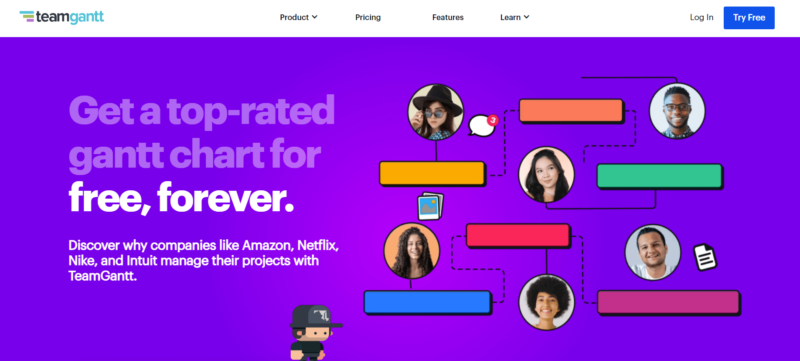
With a one project limit and usage limitations, TeamGantt’s free version is underwhelming. The Lite plan has a flat fee of $19 per month on annual billing, covering a minimum of five users. This works out roughly to $3.80 per user, which is great value. See more plans in our TeamGantt review.
- 2 users (1 manager)
- Unlimited
- Unlimited
7. Hive
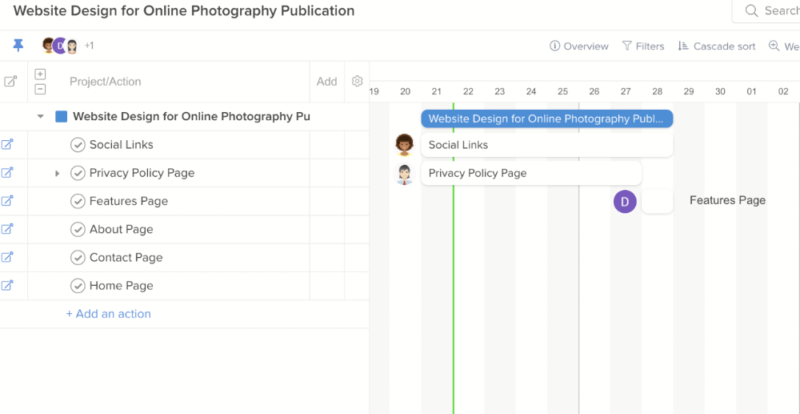
More details about Hive:
- Pricing: $18
- Free plan: Yes, limited to two users.
- Provider website: hive.com
Pros:
- Good free plan
- Contemporary design
- Solid communication tools
Cons:
- Add-ons can make it expensive
Hive aims to appeal to a range of industries by offering everything from basic features to tools for managing complex projects. Its hipster-like design — which blends retro with modern — makes Hive a great project management software for digital marketing agencies. Though it would be unfair to say that’s the only place it belongs, as its tools can assist with all types of project management.
In today’s world of remote work, it’s imperative that teams can communicate quickly and effectively. Hive understands this and has built its own messaging app. You can send standard text messages to another user or a group. You’re also able to upload and share files with others, and Hive gives you unlimited storage space across all its plans. Hive messaging also had video call functionality.
Another tool we like is Hive’s form builder. It’s simple enough to create a form. With it, you can collect order requests, submit bugs and issues, or capture information for a new project request. Form owners can create a unique link for each form and share it with both internal and external users. This, on top of its task management features, makes Hive a leading Notion alternative.
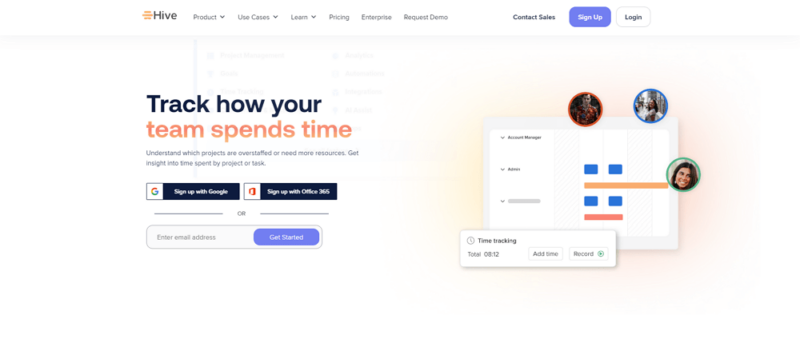
Hive’s free plan is pretty good. You can use many of its key features; the main limitation is you can only have two users per account. At $12 per user per month on annual billing, Hive isn’t cheap. Consider some additional features that cost $5 each on top of your subscription, things can get pricey, quickly. To see if it’s worth the cost, be sure to read our Hive review.
- Max 2 users; 500MB storage; Up to 10 users; Unlimited tasks; Unlimited collaborative notes; Gantt, Kanban, calendar & table views; Email in Hive; Desktop, iOS and Android apps; Native chat messaging; Custom emojis
- Price per user; Everything in “Free”; Unlimited files & storage; Unlimited workspace members; Workspace add-ons; External guest access; Shareable forms; Time tracking; In-app calendar; Cloud storage integrations; Zoom and Slack from Hive
8. Basecamp
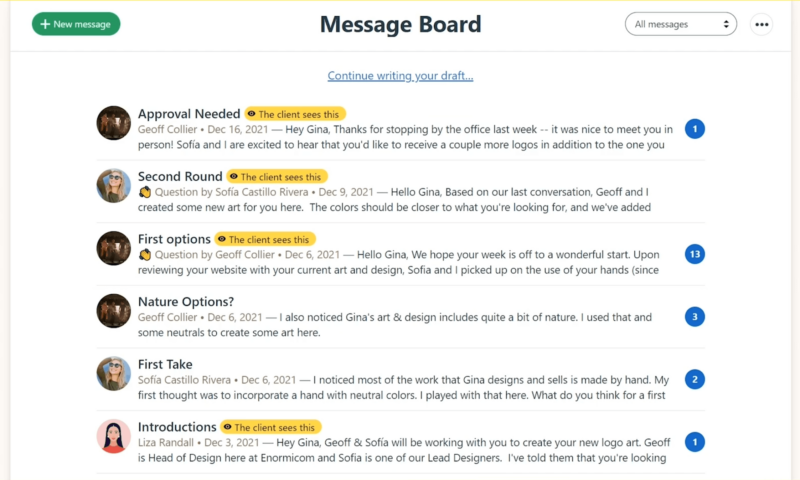
More details about Basecamp:
- Pricing: $15
- Free plan: No, 30-day free trial available on all plans.
- Provider website: basecamp.com
Pros:
- Strong communication tools
- Good task management tools
- Suited for large businesses
Cons:
- Limited feature set
Basecamp is very much a streamlined project management tool. It’s not packed with Gantt charts and spreadsheets, nor is it built for advanced methodologies, such as Agile. However, what it does do, it does very well, and for a space to tick off tasks and communicate with others, it’s one of the best.
It’s not a note-taking app, per se, but you do have a space to create basic documents and upload them. The document creator is no match for Google Docs or Microsoft Word, but it’s useful for jotting down ideas or recording meeting notes. You can also upload documents and sync them from some of the best cloud storage services.
Beyond being able to ping messages to other users, Basecamp also has a message board. This is for slightly more in-depth conversations where users can pitch ideas, share company announcements and discuss different parts of the project. Users can also subscribe to different topics in the message board to ensure they only see the content that’s relevant to them.
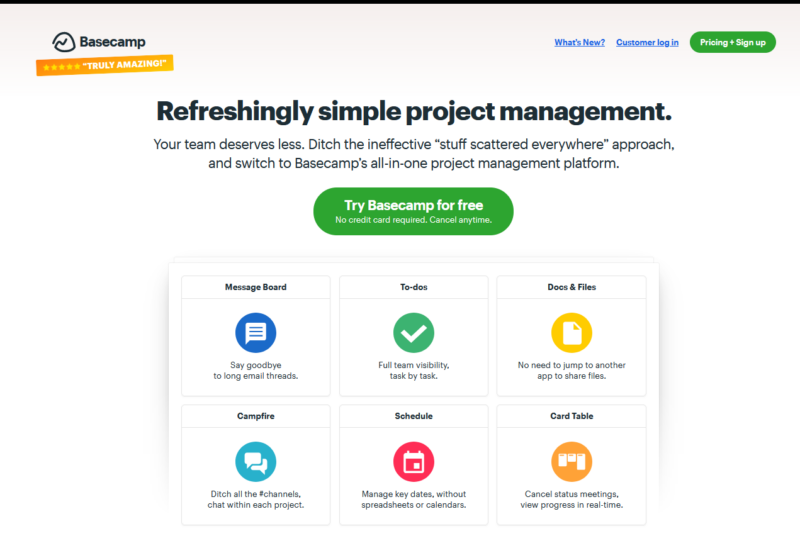
You can try Basecamp free for 30 days, after that you’ll need to pay for one of two plans. The standard plan costs $15 per user per month, which is expensive. Alternatively you can pay $299 per month and have unlimited users, which is useful if you’re a large company. Learn more in our Basecamp review.
- Per user. Unlimited projects, Unlimited users, All features. 500GB storage.
- Unlimited users. 5TB storage. Priority support.
9. Nifty
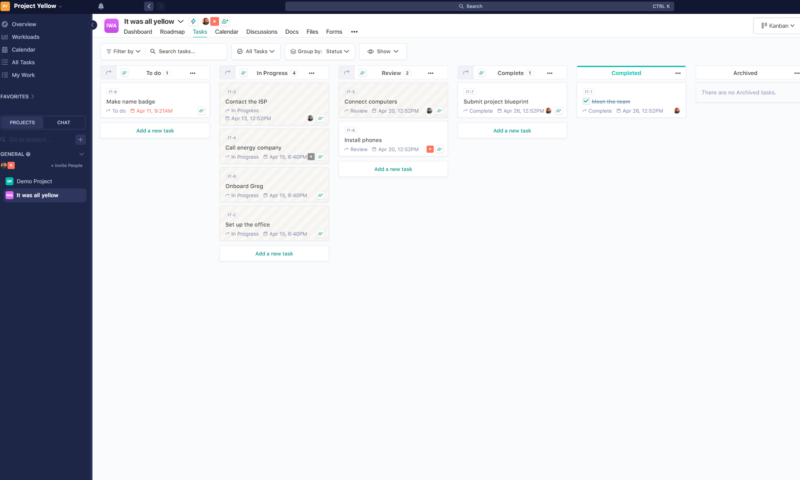
in the project management market.
More details about Nifty:
- Pricing: $5
- Free plan: Yes, Limited to two projects per account
- Provider website: niftypm.com
Pros:
- Well-priced
- Good free plan
- Plenty of features
Cons:
- Weak support options
Nifty is an easy-to-use solution that can be a simple space to create tasks or manage a more complex workload. It’s popular with software and product development teams because there’s a space for Sprint planning and milestone setting. Project managers can easily access team member workloads, as well as decide who could benefit from a break and who can complete more work.
There are some useful admin controls available with Nifty. You can save your projects as templates and easily get started if you work on a similar project later down the line. Project managers also have backend access that allows them to determine user permissions, single-sign-on (SSO) and notifications. This all helps you set up a system that works for you.
For collaboration features, Nifty has its very own chat tool. Sending direct messages is easy, and you can send voice notes too, which is a nice feature. If you want to host a video call, you can do so by integrating with a range of video calling apps. They include Google Meet, Microsoft Teams and Zoom, plus others.
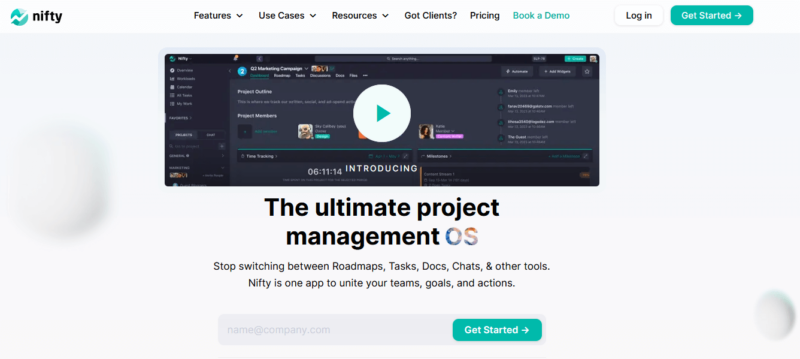
Nifty has a solid free plan but it lacks advanced features like time tracking and automations. For us, the best value lives in the Pro plan, which costs $10 per user per month on an annual subscription. To find out why, check out our full Nifty review.
- Unlimited members, Two projects, All core features, 2FA, Help center, 100MB storage
- Unlimited projects Unlimited storage, Custom roles, Workloads, Permissions, MS SSO, Open API, Priority support
- 100 projects, Workflow automations, File proofing, Overviews, Google SSO, 250GB storage
- 40 projects, Time tracking & reports, Budgets, Custom fields, Unlimited guests, 100GB storage
10. Trello
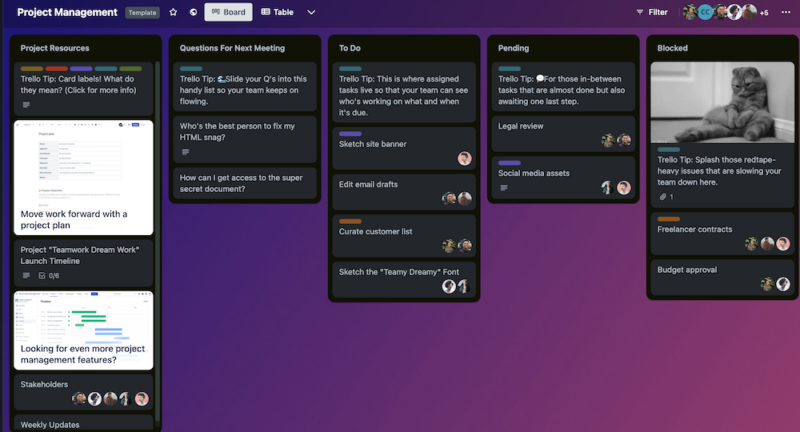
More details about Trello:
- Pricing: $6
- Free plan: Yes, limited to 10 boards per workspace
- Provider website: trello.com
Pros:
- Superb Kanban board
- Very affordable
- Generous free plan
Cons:
- Limited feature set out of the box
Trello is the best Kanban board app you can get. The drag-and-drop functionality is so smooth it releases endorphins in our mind each time we move a task to complete. This is true on both the web and mobile apps, and we especially like using the platform on a tablet. The design of the board makes it the best for getting an accurate, widespread overview of your project.
On first use, Trello does seem light on features. This is fine if you only use a Kanban board, but if you don’t, you’ll need more. Thankfully, Trello has what it calls “power ups,” which are essentially integrations. Some of the best Trello power-ups include a Gantt chart, a time tracker and a basic messaging tool.
We’d say Trello is much easier to navigate than Notion. In fact it’s one of the easiest tools to use, period. You can customize the design of your boards and functions, like creating workflows, and tagging other users in tasks is so straightforward that we’d say Trello has one of the flattest learning curves around.
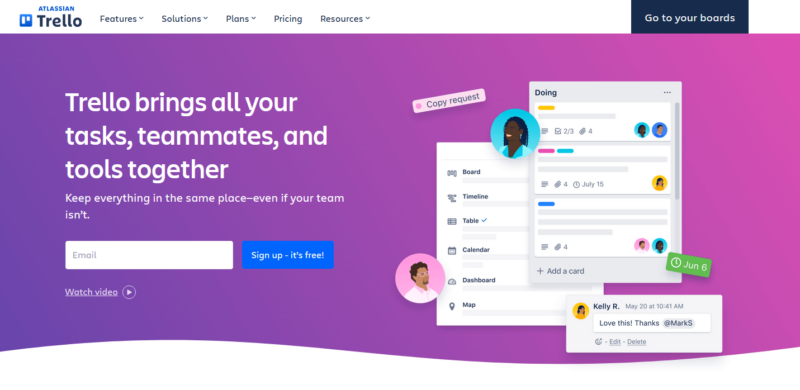
Most people won’t need more than Trello’s free plan. You can create unlimited tasks and work on 10 projects at once. If you need a space for teams, we recommend going with the Premium plan, which costs $10 per user per month on an annual subscription. Learn more in our Trello review.
- Unlimited users, 10 boards, Unlimited power-ups, Unlimited storage
- Price is per user, Unlimited boards, Custom fields, Invite guests
- Price is per user, Several new views
- Price is per user, Advanced admin & security settings
3 Best Note-Taking Alternatives to Notion
We recognize many users flock to Notion for its note-taking capabilities. Below are some honorable mentions which we believe are the best note-taking apps, and superior options compared to Notion.
1. Evernote
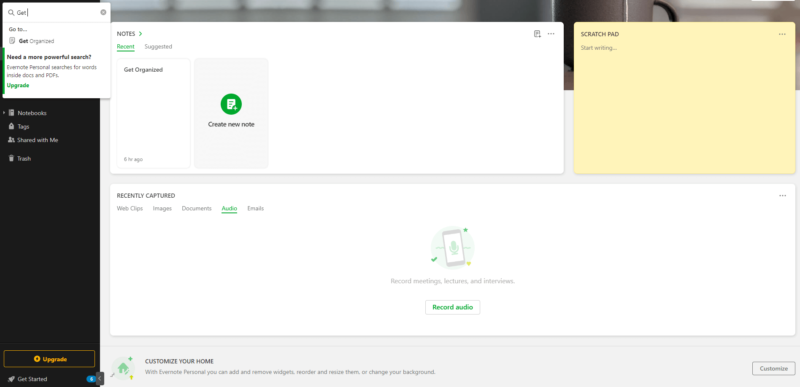
More details about Evernote:
- Pricing: $14.99
- Free plan: Yes
- Provider website: evernote.com
Pros:
- Plenty of excellent features
- Superb search functionality
Cons:
- Pricey
In the world of note-taking apps, Evernote is the best alternative to Notion. Not only can you create standard text-based notes, you can also write notes with a digital pencil, save ideas as voice notes and upload physical documents.
With optical character recognition, users can search text, even within handwritten notes, including popular file formats such as JPEG, PDF and PNG. This makes Evernote one of the most powerful tools when it comes to search functionality.
There is a free version of Evernote, which is likely going to be enough for light, everyday users. The Personal plan comes in at $14.99 per user per month and allows you to work on notes simultaneously. It’s not quite a document processor replacement, but for a space to springboard ideas and keep your notes in a centralized space, Evernote is the app to use. Learn more in our Evernote review.
- 2 devices, 60MB
- Unlimited devices, 10GB
- Unlimited devices, 20GB
- Unlimited devices, 20GB + 2 GB per user
2. Simplenote
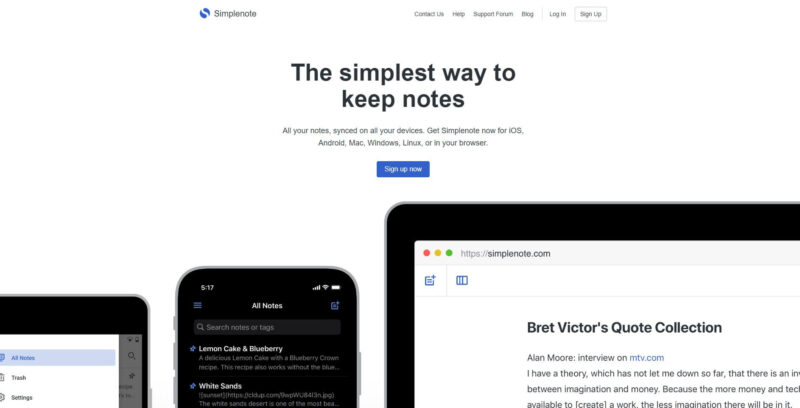
More details about Simplenote:
- Free plan: Yes
- Provider website: simplenote.com
Pros:
- Completely free
- Unlimited storage
- Available on all platforms
Cons:
- Basic features
If you don’t want to pay for a note-taking app, then Simplenote is an excellent option, if you’re a basic user. Simplenote is completely free and available on iOS, Android, Mac, Windows, Linux and your web browser.
You can take notes, create a simple to-do list and publish your notes online. While the search functionality isn’t on par with Evernote, you can add tags to your notes so you can find them quickly and effortlessly. To learn more about what’s on offer, check out our full Simplenote review.
3. Zoho Notebook
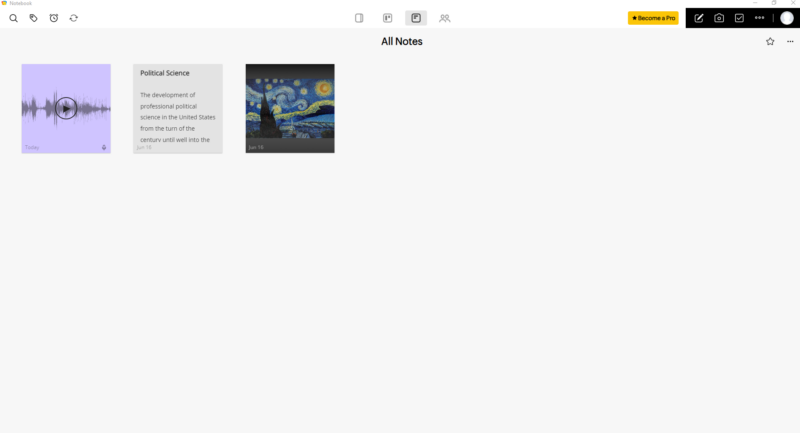
More details about Zoho Notebook:
- Pricing: $1.67
- Free plan: Yes
- Provider website: zoho.com
Pros:
- Great design
- Innovative features
- Affordable
Cons:
- Sometimes slow in performance
Zoho seemingly does it all, so it’s no surprise the company has its very own note-taking app. Notebook is another member of the ecosystem and is suitable for personal and professional note-taking.
The app aims to do things differently. Rather than standard linear note-taking functionality, Notebook has a card-based user interface. Smart cards display an overview of your notes and any files you have attached. You can add photos, sketches and audio notes to each of your smart cards.
Like many Zoho products, Notebook is extremely inexpensive. You can get a one-year subscription for as little as $1.67 per user per month. It’s still only $1.99 on a month-to-month plan. Learn more about this cheap Notion alternative in our Zoho Notebook review.
- 2GB storage
- 100GB storage
Final Thoughts
We’ve reached the end of our round up of Notion alternatives, and by now you should have found the right option for you. Remember, monday.com is the best project management platform, and it’s well-priced too. Failing that, ClickUp is your next best option, and if you’re unsure about the two, check out our monday.com vs ClickUp comparison.
Whichever Notion alternative you go for, they will help you do everything you need to do. Also, if you only require a simple task manager, it’s worth checking out our selection of the best task management software.
Did you find this article helpful? What’s your favorite note-taking app and project management tool? Is there a project management software you would like us to review? Let us know in the comments. Thanks for reading.
FAQ: Notion Alternative Options
Yes, there are many free Notion alternatives. Some of the best include Asana, ClickUp and Trello. We should note that Notion also has a free to use version of its platform.
While “better” is certainly subjective, there are some platforms we would recommend over Notion. They include monday.com, ClickUp and Asana.
Whether you need a space to create notes, a simple task management system or advanced project management features, thankfully there are many Notion alternatives. We recommend using monday.com or ClickUp. They do everything Notion can and arguably much better.
ClickUp is an excellent like-for-like Notion alternative. You can use it solely as a note-taking app, and also have a space to create documents. It has built-in AI, too, just like Notion. ClickUp is also a very good project management software — one of the best in fact — making it a great Notion alternative.
